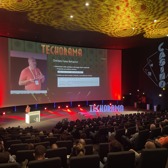Building your own Agents with Copilot Studio
UPILOT
3 days
Interested in a private company training? Request it here.
Not ready to book yet? Request an offer here.
The Microsoft Copilot Landscape
This module introduces the various Microsoft Copilot products available today and helps you understand where and how each one fits into the Microsoft 365 ecosystem. You will gain insights into licensing, extensibility and the Copilot Studio platform.
- Microsoft Copilot for Personal Usage
- Microsoft 365 Copilot for Business Users
- Using Microsoft 365 Copilot in the Web and Teams
- Understanding Agents
- The Microsoft Agent Designer Tools
- Declarative vs. Custom Agents
- Copilot Studio Extensibility Options
- Copilot Studio Licensing Options
- Copilot Credit Consumption and Pricing Models
Creating Declarative Agents
Declarative agents enable you to extend Microsoft-provided Copilots such as Microsoft 365 Copilot and Copilot for Sales by providing custom instructions, knowledge, and tools. This module walks you through building, configuring, publishing, and using declarative agents via Copilot Studio and the Microsoft 365 Copilot environment.
- What are Declarative Agents?
- Extending Microsoft 365 Copilot with Declarative Agents
- Configuring Agents with Knowledge and Tools
- Publishing and Sharing Declarative Agents
- Sharing Options and Permissions
- Managing Agents in Microsoft 365 Copilot
- Using Declarative Agents
Copilot Studio and the Power Platform
Microsoft Copilot Studio is a low-code tool within the Power Platform that allows you to create, customize and manage AI-powered agents. In this module, you will discover how Copilot Studio leverages Power Platform features such as environments and solutions to support enterprise-grade governance and lifecycle management.
- Introduction to Microsoft Copilot Studio
- How Copilot Studio Relates to the Power Platform
- Understanding Environments in the Power Platform
- Introduction to Dataverse
- Solutions in the Power Platform
- Packaging Agents for ALM
- LAB: Prepare Your Environment for Agent Creation
Creating Your First Agent with Copilot Studio
Learn how to build your first custom agent using Microsoft Copilot Studio. This chapter introduces you to the core components of an agent — Knowledge, Topics, and Tools — and guides you through the process of creating, configuring and publishing your first agent.
- Getting Started with Copilot Studio
- Creating a New Agent
- Setting Agent Name, Description and Settings
- Configuring General vs Custom Knowledge
- Understanding Topics and Their Purpose
- Using Tools to Extend Agent Functionality
- Understanding Generative vs Classic Orchestration
- Publishing Your Agent to Channels (Teams, Microsoft 365 Copilot, Web, etc.)
- LAB: Create Your First Agent
Adding Knowledge Sources to an Agent
To make your agent truly intelligent, you can connect it to various knowledge sources — including websites, SharePoint, documents, and Dataverse. This chapter explains how to ground your agent in organizational data and configure secure access to enterprise knowledge.
- Overview of Knowledge Sources
- Adding Public Website Knowledge
- Adding Document Knowledge
- Adding Dataverse Knowledge
- SharePoint and OneDrive Knowledge
- Adding Knowledge via Copilot Connectors
- Editing and Testing Knowledge
- LAB: Adding Knowledge Sources to an Agent
Working with Topics
Topics define how your agent interacts with users. They represent structured conversations your agent can handle. In this chapter, you’ll learn how to create, configure, and manage topics, define triggers, and design engaging conversation flows.
- What are Topics?
- System Topics vs Custom Topics
- Creating and Editing Topics
- Configuring Topic Triggers
- Sending Messages and Asking Questions in a Topic
- Branching and Looping
- Working with Variables
- Working with Power FX and Adaptive Cards
- Orchestrating Topics Using Generative AI
- LAB: Working with Topics
Enhancing Agents with Tools
Tools enable your agents to interact with external systems, perform actions, and extend their functionality beyond simple conversations. This module explores how to define, configure, and use Tools in Microsoft Copilot Studio, including connectors, flows, and Model Context Protocol (MCP) servers.
- What are Tools?
- Creating Connector Tools
- Customizing Responses using Adaptive Cards and Power FX
- Invoking Tools in Generative Mode and from Topics
- Creating and Using Power Automate Flow Tools
- Creating Agent Flows in Copilot Studio
- Integrating MCP Servers as Tools
- LAB: Enhancing Agents with Tools
Building an Autonomous Agent
Autonomous agents are capable of executing actions automatically based on events or triggers, without human intervention. This module teaches how to configure agents that respond to real-world signals such as incoming emails, new data entries, or scheduled events.
- Introduction to Autonomous Agents
- Understanding Event Triggers
- Adding Event Triggers in Copilot Studio
- Event Triggers and Power Automate
- Testing Event Triggers
- Publishing Agents with Event Triggers
- Licensing Considerations
- Limitations of Knowledge Sources
- LAB: Building an Autonomous Agent
Publishing and Monitoring an Agent
Once your agent is complete, you can publish it to multiple platforms and monitor its performance through detailed analytics. This chapter guides you through authentication, sharing, publishing, and analyzing your agents’ effectiveness.
- Setting up Authentication for Agents
- Authentication Modes (None, Microsoft, OAuth2, Entra ID)
- Sharing Agents with Users and Teams
- Publishing to Channels (Web, Microsoft Teams, Microsoft 365 Copilot)
- Adding an Agent to a Website
- Customizing Agent Appearance in Teams
- Monitoring Agent Performance and Usage
- Analyzing Engagement, Resolution, and Satisfaction Metrics
- Exporting and Reviewing Conversation Transcripts
- Capturing and Analyzing Telemetry with Azure Application Insights
Microsoft Copilot Studio lets you create AI-powered agents through an intuitive no-code interface, without needing to be a developer or data scientist. In this course you will explore the Microsoft Copilot ecosystem and learn how to build, configure and publish your own AI agents that extend Microsoft 365 and the Power Platform. By the end of the course you will be ready to create intelligent agents connected to your organization’s data and automate business processes tailored to your needs.
This 3-day course is intended for power users, Power Platform developers, business users, and solution architects who want to build agents using Copilot Studio. Basic familiarity with the Power Platform or Power Automate is helpful but not required.







